Detailed Case Study on Auditing: Ethical Principles and Audit Opinions
VerifiedAdded on 2023/04/23
|11
|2889
|266
Case Study
AI Summary
This case study delves into various scenarios involving auditing ethical principles and the formation of audit opinions. It examines situations where auditors face potential conflicts of interest, confidentiality breaches, and compromised independence. Specifically, it analyzes scenarios involving referral fees, data confidentiality, board membership, and overdue fees, assessing whether these actions violate APES 110. Furthermore, the study explores the implications of these ethical breaches on audit opinions, such as disclaimer of opinion and qualified opinion, based on limitations in acquiring audit evidence and material misstatements in financial reports. The analysis provides a comprehensive understanding of the ethical responsibilities of auditors and the consequences of non-compliance with auditing standards.
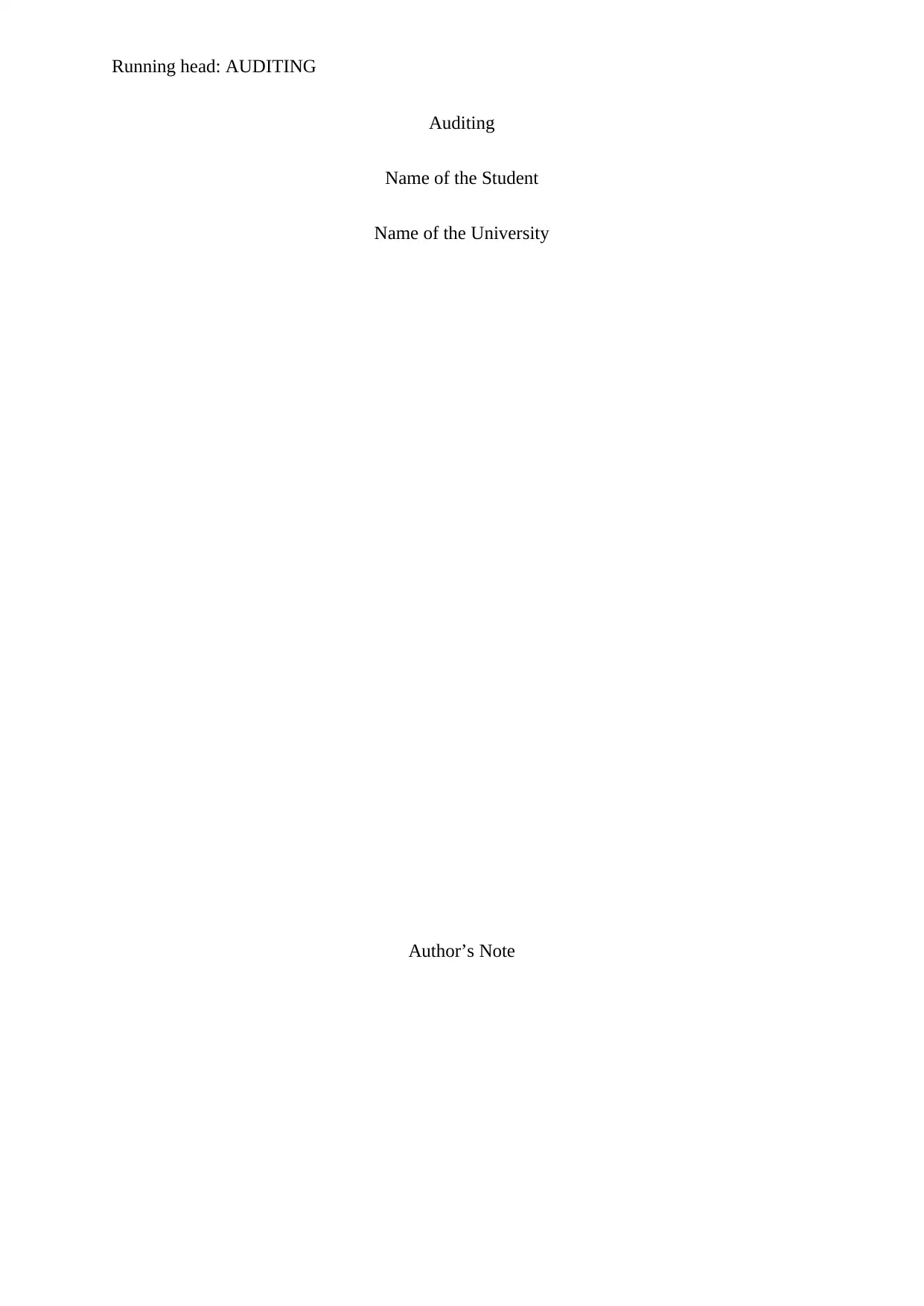
Running head: AUDITING
Auditing
Name of the Student
Name of the University
Author’s Note
Auditing
Name of the Student
Name of the University
Author’s Note
Paraphrase This Document
Need a fresh take? Get an instant paraphrase of this document with our AI Paraphraser
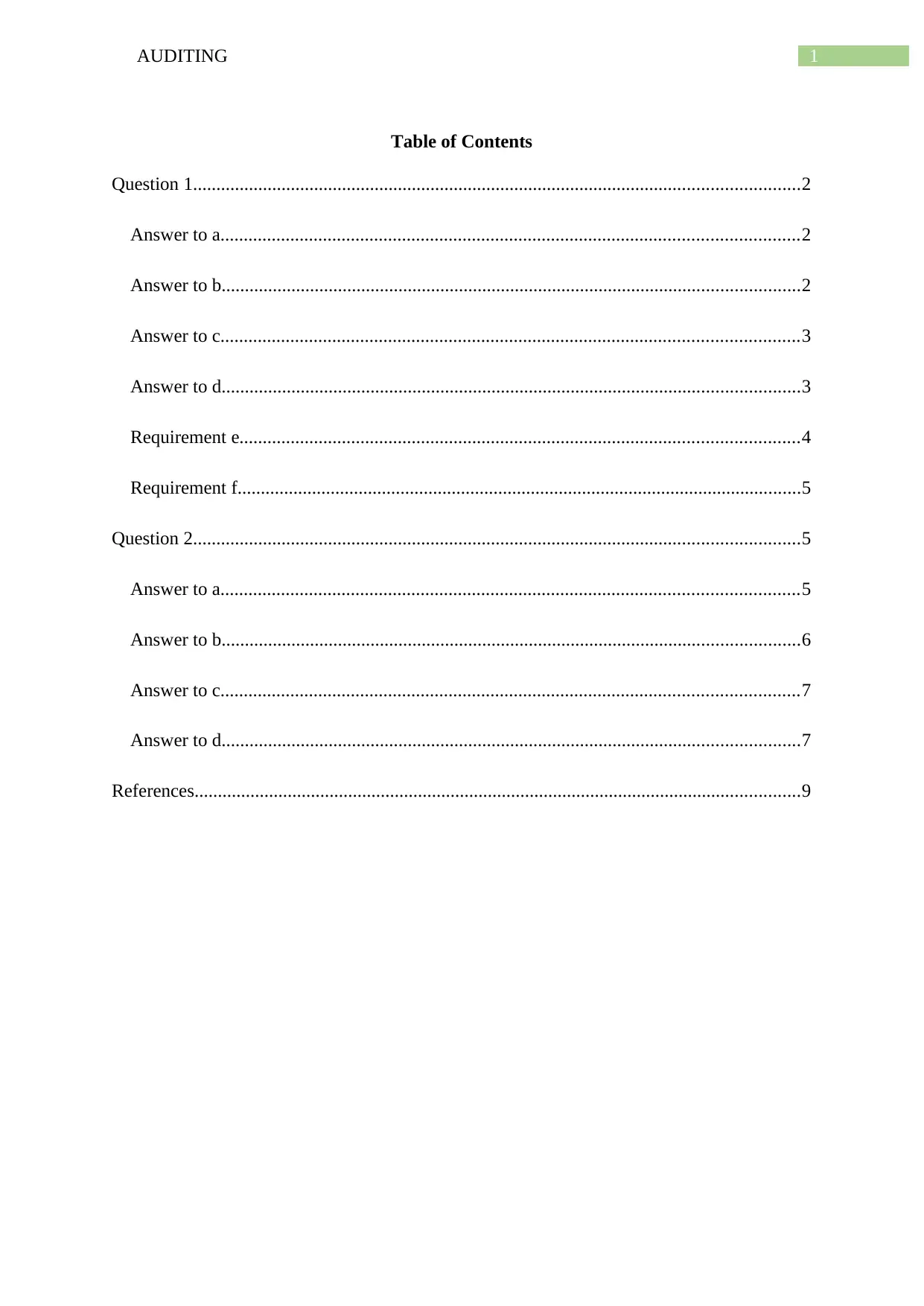
1AUDITING
Table of Contents
Question 1..................................................................................................................................2
Answer to a............................................................................................................................2
Answer to b............................................................................................................................2
Answer to c............................................................................................................................3
Answer to d............................................................................................................................3
Requirement e........................................................................................................................4
Requirement f.........................................................................................................................5
Question 2..................................................................................................................................5
Answer to a............................................................................................................................5
Answer to b............................................................................................................................6
Answer to c............................................................................................................................7
Answer to d............................................................................................................................7
References..................................................................................................................................9
Table of Contents
Question 1..................................................................................................................................2
Answer to a............................................................................................................................2
Answer to b............................................................................................................................2
Answer to c............................................................................................................................3
Answer to d............................................................................................................................3
Requirement e........................................................................................................................4
Requirement f.........................................................................................................................5
Question 2..................................................................................................................................5
Answer to a............................................................................................................................5
Answer to b............................................................................................................................6
Answer to c............................................................................................................................7
Answer to d............................................................................................................................7
References..................................................................................................................................9
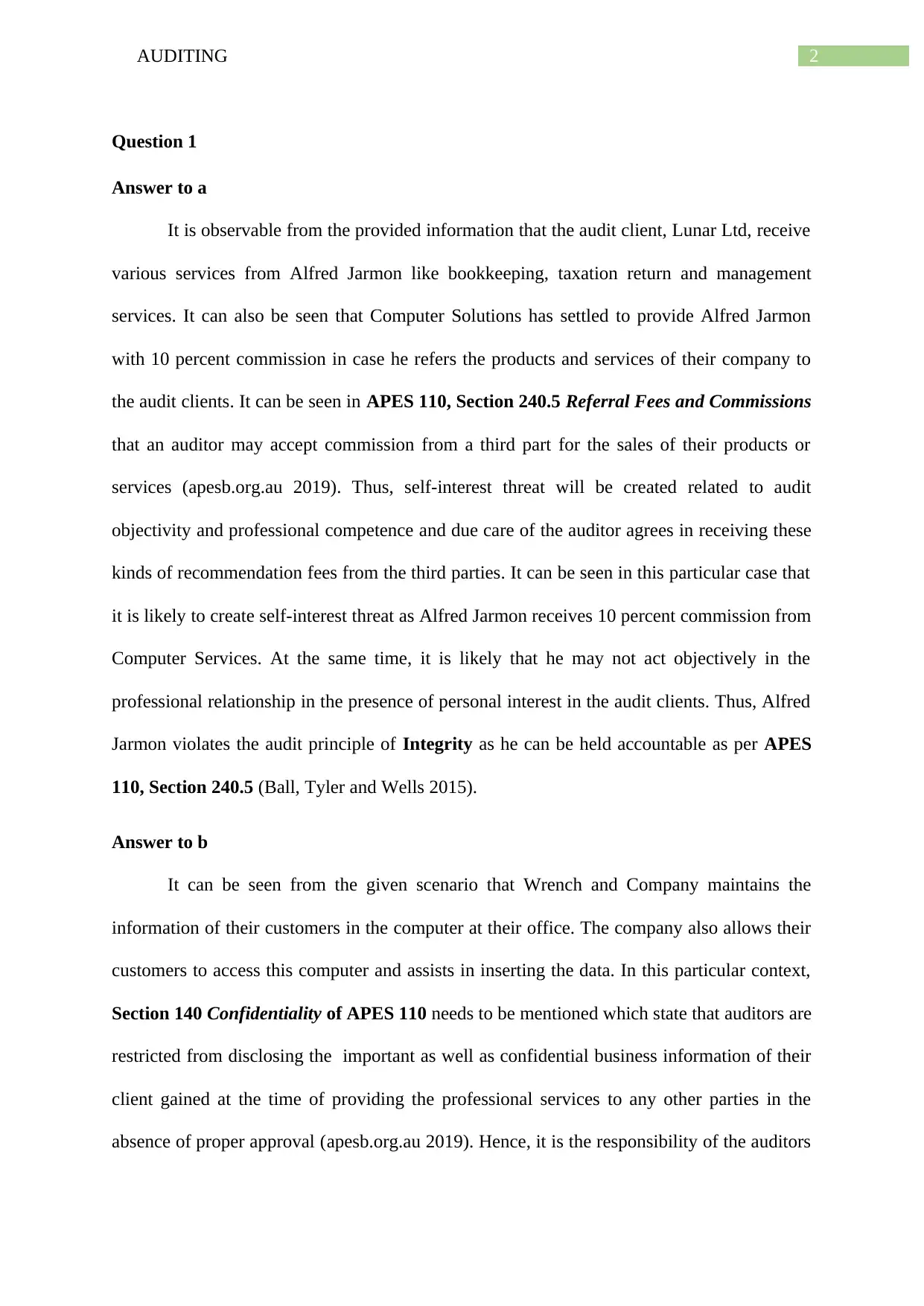
2AUDITING
Question 1
Answer to a
It is observable from the provided information that the audit client, Lunar Ltd, receive
various services from Alfred Jarmon like bookkeeping, taxation return and management
services. It can also be seen that Computer Solutions has settled to provide Alfred Jarmon
with 10 percent commission in case he refers the products and services of their company to
the audit clients. It can be seen in APES 110, Section 240.5 Referral Fees and Commissions
that an auditor may accept commission from a third part for the sales of their products or
services (apesb.org.au 2019). Thus, self-interest threat will be created related to audit
objectivity and professional competence and due care of the auditor agrees in receiving these
kinds of recommendation fees from the third parties. It can be seen in this particular case that
it is likely to create self-interest threat as Alfred Jarmon receives 10 percent commission from
Computer Services. At the same time, it is likely that he may not act objectively in the
professional relationship in the presence of personal interest in the audit clients. Thus, Alfred
Jarmon violates the audit principle of Integrity as he can be held accountable as per APES
110, Section 240.5 (Ball, Tyler and Wells 2015).
Answer to b
It can be seen from the given scenario that Wrench and Company maintains the
information of their customers in the computer at their office. The company also allows their
customers to access this computer and assists in inserting the data. In this particular context,
Section 140 Confidentiality of APES 110 needs to be mentioned which state that auditors are
restricted from disclosing the important as well as confidential business information of their
client gained at the time of providing the professional services to any other parties in the
absence of proper approval (apesb.org.au 2019). Hence, it is the responsibility of the auditors
Question 1
Answer to a
It is observable from the provided information that the audit client, Lunar Ltd, receive
various services from Alfred Jarmon like bookkeeping, taxation return and management
services. It can also be seen that Computer Solutions has settled to provide Alfred Jarmon
with 10 percent commission in case he refers the products and services of their company to
the audit clients. It can be seen in APES 110, Section 240.5 Referral Fees and Commissions
that an auditor may accept commission from a third part for the sales of their products or
services (apesb.org.au 2019). Thus, self-interest threat will be created related to audit
objectivity and professional competence and due care of the auditor agrees in receiving these
kinds of recommendation fees from the third parties. It can be seen in this particular case that
it is likely to create self-interest threat as Alfred Jarmon receives 10 percent commission from
Computer Services. At the same time, it is likely that he may not act objectively in the
professional relationship in the presence of personal interest in the audit clients. Thus, Alfred
Jarmon violates the audit principle of Integrity as he can be held accountable as per APES
110, Section 240.5 (Ball, Tyler and Wells 2015).
Answer to b
It can be seen from the given scenario that Wrench and Company maintains the
information of their customers in the computer at their office. The company also allows their
customers to access this computer and assists in inserting the data. In this particular context,
Section 140 Confidentiality of APES 110 needs to be mentioned which state that auditors are
restricted from disclosing the important as well as confidential business information of their
client gained at the time of providing the professional services to any other parties in the
absence of proper approval (apesb.org.au 2019). Hence, it is the responsibility of the auditors
⊘ This is a preview!⊘
Do you want full access?
Subscribe today to unlock all pages.

Trusted by 1+ million students worldwide
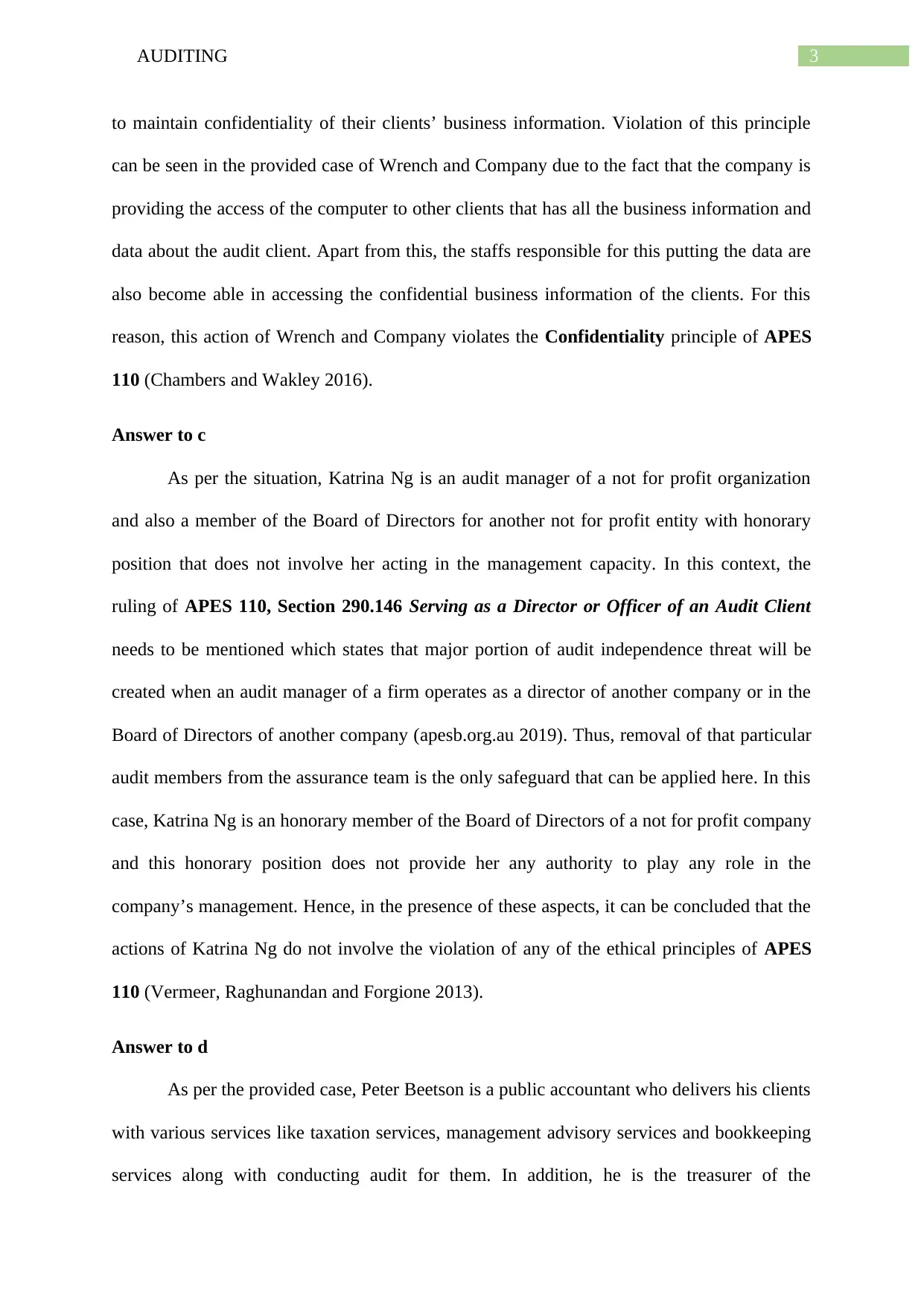
3AUDITING
to maintain confidentiality of their clients’ business information. Violation of this principle
can be seen in the provided case of Wrench and Company due to the fact that the company is
providing the access of the computer to other clients that has all the business information and
data about the audit client. Apart from this, the staffs responsible for this putting the data are
also become able in accessing the confidential business information of the clients. For this
reason, this action of Wrench and Company violates the Confidentiality principle of APES
110 (Chambers and Wakley 2016).
Answer to c
As per the situation, Katrina Ng is an audit manager of a not for profit organization
and also a member of the Board of Directors for another not for profit entity with honorary
position that does not involve her acting in the management capacity. In this context, the
ruling of APES 110, Section 290.146 Serving as a Director or Officer of an Audit Client
needs to be mentioned which states that major portion of audit independence threat will be
created when an audit manager of a firm operates as a director of another company or in the
Board of Directors of another company (apesb.org.au 2019). Thus, removal of that particular
audit members from the assurance team is the only safeguard that can be applied here. In this
case, Katrina Ng is an honorary member of the Board of Directors of a not for profit company
and this honorary position does not provide her any authority to play any role in the
company’s management. Hence, in the presence of these aspects, it can be concluded that the
actions of Katrina Ng do not involve the violation of any of the ethical principles of APES
110 (Vermeer, Raghunandan and Forgione 2013).
Answer to d
As per the provided case, Peter Beetson is a public accountant who delivers his clients
with various services like taxation services, management advisory services and bookkeeping
services along with conducting audit for them. In addition, he is the treasurer of the
to maintain confidentiality of their clients’ business information. Violation of this principle
can be seen in the provided case of Wrench and Company due to the fact that the company is
providing the access of the computer to other clients that has all the business information and
data about the audit client. Apart from this, the staffs responsible for this putting the data are
also become able in accessing the confidential business information of the clients. For this
reason, this action of Wrench and Company violates the Confidentiality principle of APES
110 (Chambers and Wakley 2016).
Answer to c
As per the situation, Katrina Ng is an audit manager of a not for profit organization
and also a member of the Board of Directors for another not for profit entity with honorary
position that does not involve her acting in the management capacity. In this context, the
ruling of APES 110, Section 290.146 Serving as a Director or Officer of an Audit Client
needs to be mentioned which states that major portion of audit independence threat will be
created when an audit manager of a firm operates as a director of another company or in the
Board of Directors of another company (apesb.org.au 2019). Thus, removal of that particular
audit members from the assurance team is the only safeguard that can be applied here. In this
case, Katrina Ng is an honorary member of the Board of Directors of a not for profit company
and this honorary position does not provide her any authority to play any role in the
company’s management. Hence, in the presence of these aspects, it can be concluded that the
actions of Katrina Ng do not involve the violation of any of the ethical principles of APES
110 (Vermeer, Raghunandan and Forgione 2013).
Answer to d
As per the provided case, Peter Beetson is a public accountant who delivers his clients
with various services like taxation services, management advisory services and bookkeeping
services along with conducting audit for them. In addition, he is the treasurer of the
Paraphrase This Document
Need a fresh take? Get an instant paraphrase of this document with our AI Paraphraser
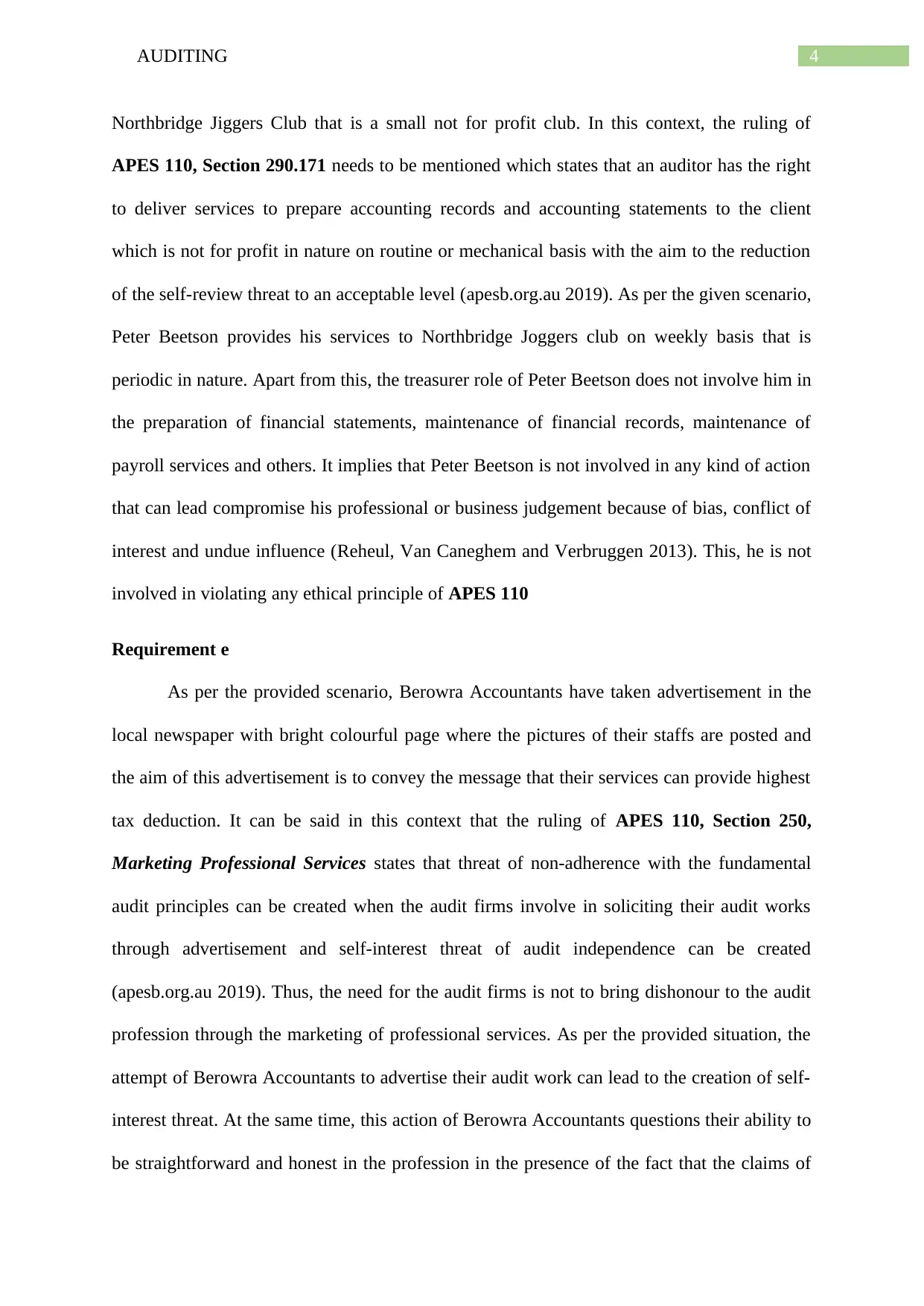
4AUDITING
Northbridge Jiggers Club that is a small not for profit club. In this context, the ruling of
APES 110, Section 290.171 needs to be mentioned which states that an auditor has the right
to deliver services to prepare accounting records and accounting statements to the client
which is not for profit in nature on routine or mechanical basis with the aim to the reduction
of the self-review threat to an acceptable level (apesb.org.au 2019). As per the given scenario,
Peter Beetson provides his services to Northbridge Joggers club on weekly basis that is
periodic in nature. Apart from this, the treasurer role of Peter Beetson does not involve him in
the preparation of financial statements, maintenance of financial records, maintenance of
payroll services and others. It implies that Peter Beetson is not involved in any kind of action
that can lead compromise his professional or business judgement because of bias, conflict of
interest and undue influence (Reheul, Van Caneghem and Verbruggen 2013). This, he is not
involved in violating any ethical principle of APES 110
Requirement e
As per the provided scenario, Berowra Accountants have taken advertisement in the
local newspaper with bright colourful page where the pictures of their staffs are posted and
the aim of this advertisement is to convey the message that their services can provide highest
tax deduction. It can be said in this context that the ruling of APES 110, Section 250,
Marketing Professional Services states that threat of non-adherence with the fundamental
audit principles can be created when the audit firms involve in soliciting their audit works
through advertisement and self-interest threat of audit independence can be created
(apesb.org.au 2019). Thus, the need for the audit firms is not to bring dishonour to the audit
profession through the marketing of professional services. As per the provided situation, the
attempt of Berowra Accountants to advertise their audit work can lead to the creation of self-
interest threat. At the same time, this action of Berowra Accountants questions their ability to
be straightforward and honest in the profession in the presence of the fact that the claims of
Northbridge Jiggers Club that is a small not for profit club. In this context, the ruling of
APES 110, Section 290.171 needs to be mentioned which states that an auditor has the right
to deliver services to prepare accounting records and accounting statements to the client
which is not for profit in nature on routine or mechanical basis with the aim to the reduction
of the self-review threat to an acceptable level (apesb.org.au 2019). As per the given scenario,
Peter Beetson provides his services to Northbridge Joggers club on weekly basis that is
periodic in nature. Apart from this, the treasurer role of Peter Beetson does not involve him in
the preparation of financial statements, maintenance of financial records, maintenance of
payroll services and others. It implies that Peter Beetson is not involved in any kind of action
that can lead compromise his professional or business judgement because of bias, conflict of
interest and undue influence (Reheul, Van Caneghem and Verbruggen 2013). This, he is not
involved in violating any ethical principle of APES 110
Requirement e
As per the provided scenario, Berowra Accountants have taken advertisement in the
local newspaper with bright colourful page where the pictures of their staffs are posted and
the aim of this advertisement is to convey the message that their services can provide highest
tax deduction. It can be said in this context that the ruling of APES 110, Section 250,
Marketing Professional Services states that threat of non-adherence with the fundamental
audit principles can be created when the audit firms involve in soliciting their audit works
through advertisement and self-interest threat of audit independence can be created
(apesb.org.au 2019). Thus, the need for the audit firms is not to bring dishonour to the audit
profession through the marketing of professional services. As per the provided situation, the
attempt of Berowra Accountants to advertise their audit work can lead to the creation of self-
interest threat. At the same time, this action of Berowra Accountants questions their ability to
be straightforward and honest in the profession in the presence of the fact that the claims of
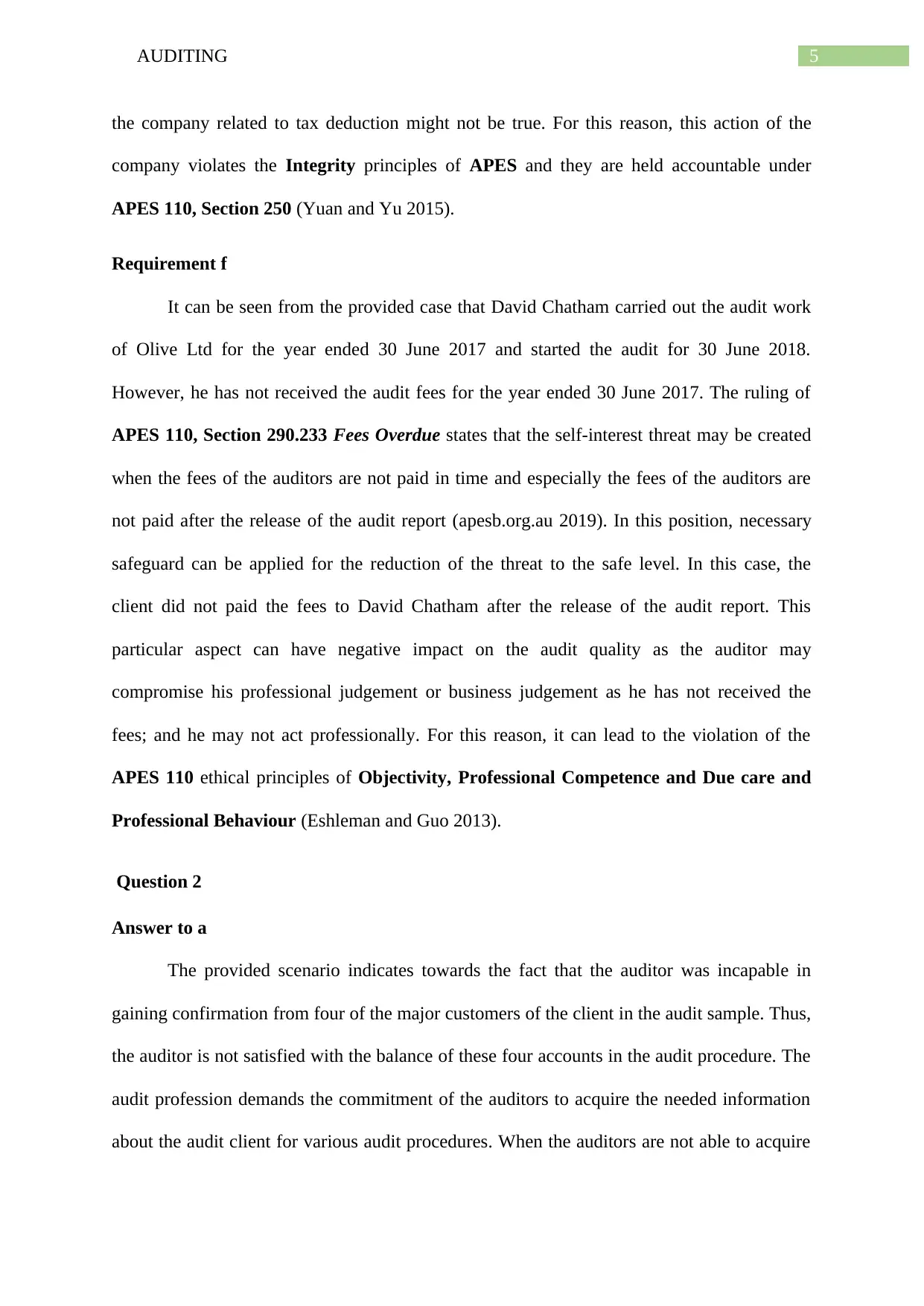
5AUDITING
the company related to tax deduction might not be true. For this reason, this action of the
company violates the Integrity principles of APES and they are held accountable under
APES 110, Section 250 (Yuan and Yu 2015).
Requirement f
It can be seen from the provided case that David Chatham carried out the audit work
of Olive Ltd for the year ended 30 June 2017 and started the audit for 30 June 2018.
However, he has not received the audit fees for the year ended 30 June 2017. The ruling of
APES 110, Section 290.233 Fees Overdue states that the self-interest threat may be created
when the fees of the auditors are not paid in time and especially the fees of the auditors are
not paid after the release of the audit report (apesb.org.au 2019). In this position, necessary
safeguard can be applied for the reduction of the threat to the safe level. In this case, the
client did not paid the fees to David Chatham after the release of the audit report. This
particular aspect can have negative impact on the audit quality as the auditor may
compromise his professional judgement or business judgement as he has not received the
fees; and he may not act professionally. For this reason, it can lead to the violation of the
APES 110 ethical principles of Objectivity, Professional Competence and Due care and
Professional Behaviour (Eshleman and Guo 2013).
Question 2
Answer to a
The provided scenario indicates towards the fact that the auditor was incapable in
gaining confirmation from four of the major customers of the client in the audit sample. Thus,
the auditor is not satisfied with the balance of these four accounts in the audit procedure. The
audit profession demands the commitment of the auditors to acquire the needed information
about the audit client for various audit procedures. When the auditors are not able to acquire
the company related to tax deduction might not be true. For this reason, this action of the
company violates the Integrity principles of APES and they are held accountable under
APES 110, Section 250 (Yuan and Yu 2015).
Requirement f
It can be seen from the provided case that David Chatham carried out the audit work
of Olive Ltd for the year ended 30 June 2017 and started the audit for 30 June 2018.
However, he has not received the audit fees for the year ended 30 June 2017. The ruling of
APES 110, Section 290.233 Fees Overdue states that the self-interest threat may be created
when the fees of the auditors are not paid in time and especially the fees of the auditors are
not paid after the release of the audit report (apesb.org.au 2019). In this position, necessary
safeguard can be applied for the reduction of the threat to the safe level. In this case, the
client did not paid the fees to David Chatham after the release of the audit report. This
particular aspect can have negative impact on the audit quality as the auditor may
compromise his professional judgement or business judgement as he has not received the
fees; and he may not act professionally. For this reason, it can lead to the violation of the
APES 110 ethical principles of Objectivity, Professional Competence and Due care and
Professional Behaviour (Eshleman and Guo 2013).
Question 2
Answer to a
The provided scenario indicates towards the fact that the auditor was incapable in
gaining confirmation from four of the major customers of the client in the audit sample. Thus,
the auditor is not satisfied with the balance of these four accounts in the audit procedure. The
audit profession demands the commitment of the auditors to acquire the needed information
about the audit client for various audit procedures. When the auditors are not able to acquire
⊘ This is a preview!⊘
Do you want full access?
Subscribe today to unlock all pages.

Trusted by 1+ million students worldwide
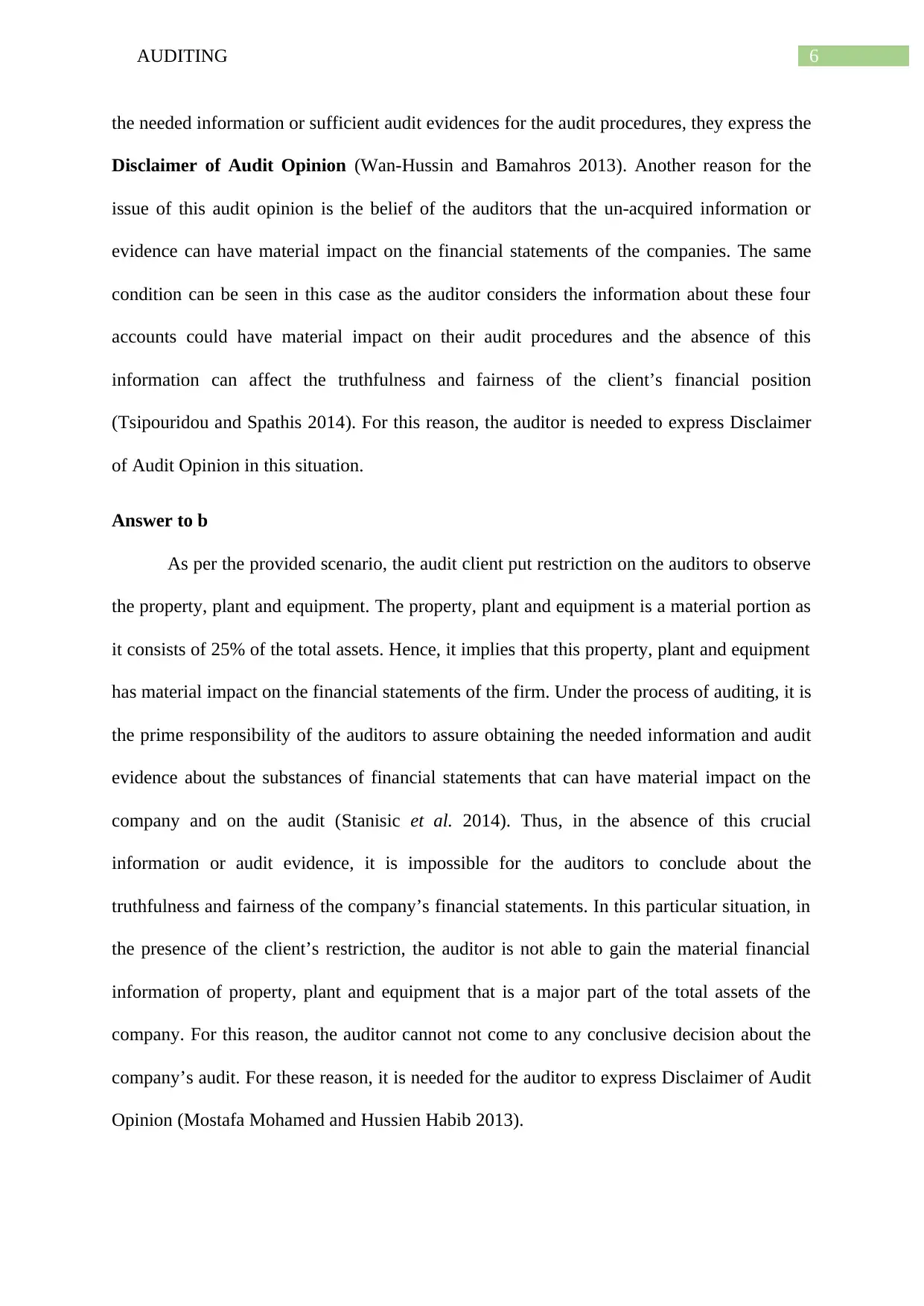
6AUDITING
the needed information or sufficient audit evidences for the audit procedures, they express the
Disclaimer of Audit Opinion (Wan-Hussin and Bamahros 2013). Another reason for the
issue of this audit opinion is the belief of the auditors that the un-acquired information or
evidence can have material impact on the financial statements of the companies. The same
condition can be seen in this case as the auditor considers the information about these four
accounts could have material impact on their audit procedures and the absence of this
information can affect the truthfulness and fairness of the client’s financial position
(Tsipouridou and Spathis 2014). For this reason, the auditor is needed to express Disclaimer
of Audit Opinion in this situation.
Answer to b
As per the provided scenario, the audit client put restriction on the auditors to observe
the property, plant and equipment. The property, plant and equipment is a material portion as
it consists of 25% of the total assets. Hence, it implies that this property, plant and equipment
has material impact on the financial statements of the firm. Under the process of auditing, it is
the prime responsibility of the auditors to assure obtaining the needed information and audit
evidence about the substances of financial statements that can have material impact on the
company and on the audit (Stanisic et al. 2014). Thus, in the absence of this crucial
information or audit evidence, it is impossible for the auditors to conclude about the
truthfulness and fairness of the company’s financial statements. In this particular situation, in
the presence of the client’s restriction, the auditor is not able to gain the material financial
information of property, plant and equipment that is a major part of the total assets of the
company. For this reason, the auditor cannot not come to any conclusive decision about the
company’s audit. For these reason, it is needed for the auditor to express Disclaimer of Audit
Opinion (Mostafa Mohamed and Hussien Habib 2013).
the needed information or sufficient audit evidences for the audit procedures, they express the
Disclaimer of Audit Opinion (Wan-Hussin and Bamahros 2013). Another reason for the
issue of this audit opinion is the belief of the auditors that the un-acquired information or
evidence can have material impact on the financial statements of the companies. The same
condition can be seen in this case as the auditor considers the information about these four
accounts could have material impact on their audit procedures and the absence of this
information can affect the truthfulness and fairness of the client’s financial position
(Tsipouridou and Spathis 2014). For this reason, the auditor is needed to express Disclaimer
of Audit Opinion in this situation.
Answer to b
As per the provided scenario, the audit client put restriction on the auditors to observe
the property, plant and equipment. The property, plant and equipment is a material portion as
it consists of 25% of the total assets. Hence, it implies that this property, plant and equipment
has material impact on the financial statements of the firm. Under the process of auditing, it is
the prime responsibility of the auditors to assure obtaining the needed information and audit
evidence about the substances of financial statements that can have material impact on the
company and on the audit (Stanisic et al. 2014). Thus, in the absence of this crucial
information or audit evidence, it is impossible for the auditors to conclude about the
truthfulness and fairness of the company’s financial statements. In this particular situation, in
the presence of the client’s restriction, the auditor is not able to gain the material financial
information of property, plant and equipment that is a major part of the total assets of the
company. For this reason, the auditor cannot not come to any conclusive decision about the
company’s audit. For these reason, it is needed for the auditor to express Disclaimer of Audit
Opinion (Mostafa Mohamed and Hussien Habib 2013).
Paraphrase This Document
Need a fresh take? Get an instant paraphrase of this document with our AI Paraphraser
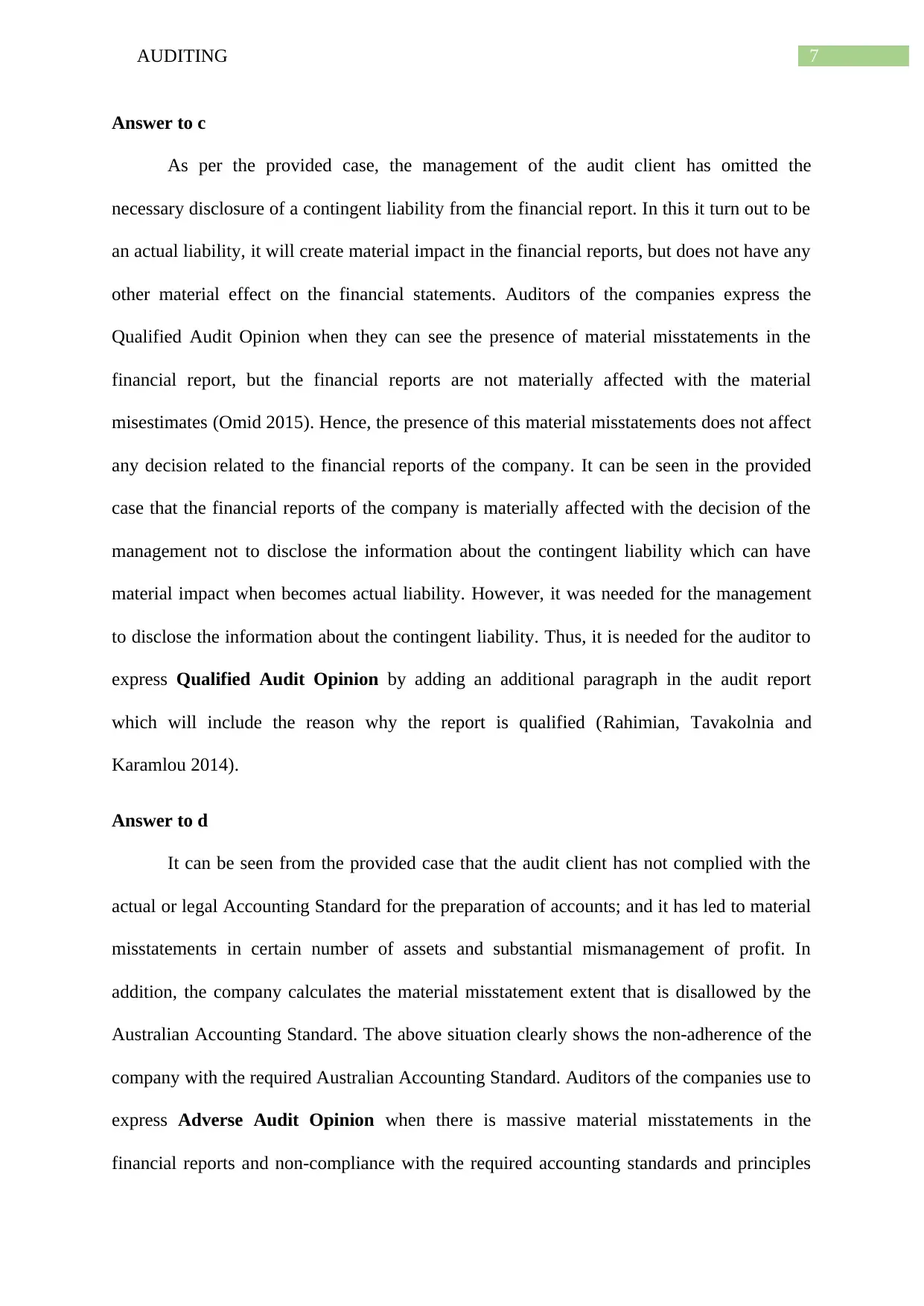
7AUDITING
Answer to c
As per the provided case, the management of the audit client has omitted the
necessary disclosure of a contingent liability from the financial report. In this it turn out to be
an actual liability, it will create material impact in the financial reports, but does not have any
other material effect on the financial statements. Auditors of the companies express the
Qualified Audit Opinion when they can see the presence of material misstatements in the
financial report, but the financial reports are not materially affected with the material
misestimates (Omid 2015). Hence, the presence of this material misstatements does not affect
any decision related to the financial reports of the company. It can be seen in the provided
case that the financial reports of the company is materially affected with the decision of the
management not to disclose the information about the contingent liability which can have
material impact when becomes actual liability. However, it was needed for the management
to disclose the information about the contingent liability. Thus, it is needed for the auditor to
express Qualified Audit Opinion by adding an additional paragraph in the audit report
which will include the reason why the report is qualified (Rahimian, Tavakolnia and
Karamlou 2014).
Answer to d
It can be seen from the provided case that the audit client has not complied with the
actual or legal Accounting Standard for the preparation of accounts; and it has led to material
misstatements in certain number of assets and substantial mismanagement of profit. In
addition, the company calculates the material misstatement extent that is disallowed by the
Australian Accounting Standard. The above situation clearly shows the non-adherence of the
company with the required Australian Accounting Standard. Auditors of the companies use to
express Adverse Audit Opinion when there is massive material misstatements in the
financial reports and non-compliance with the required accounting standards and principles
Answer to c
As per the provided case, the management of the audit client has omitted the
necessary disclosure of a contingent liability from the financial report. In this it turn out to be
an actual liability, it will create material impact in the financial reports, but does not have any
other material effect on the financial statements. Auditors of the companies express the
Qualified Audit Opinion when they can see the presence of material misstatements in the
financial report, but the financial reports are not materially affected with the material
misestimates (Omid 2015). Hence, the presence of this material misstatements does not affect
any decision related to the financial reports of the company. It can be seen in the provided
case that the financial reports of the company is materially affected with the decision of the
management not to disclose the information about the contingent liability which can have
material impact when becomes actual liability. However, it was needed for the management
to disclose the information about the contingent liability. Thus, it is needed for the auditor to
express Qualified Audit Opinion by adding an additional paragraph in the audit report
which will include the reason why the report is qualified (Rahimian, Tavakolnia and
Karamlou 2014).
Answer to d
It can be seen from the provided case that the audit client has not complied with the
actual or legal Accounting Standard for the preparation of accounts; and it has led to material
misstatements in certain number of assets and substantial mismanagement of profit. In
addition, the company calculates the material misstatement extent that is disallowed by the
Australian Accounting Standard. The above situation clearly shows the non-adherence of the
company with the required Australian Accounting Standard. Auditors of the companies use to
express Adverse Audit Opinion when there is massive material misstatements in the
financial reports and non-compliance with the required accounting standards and principles
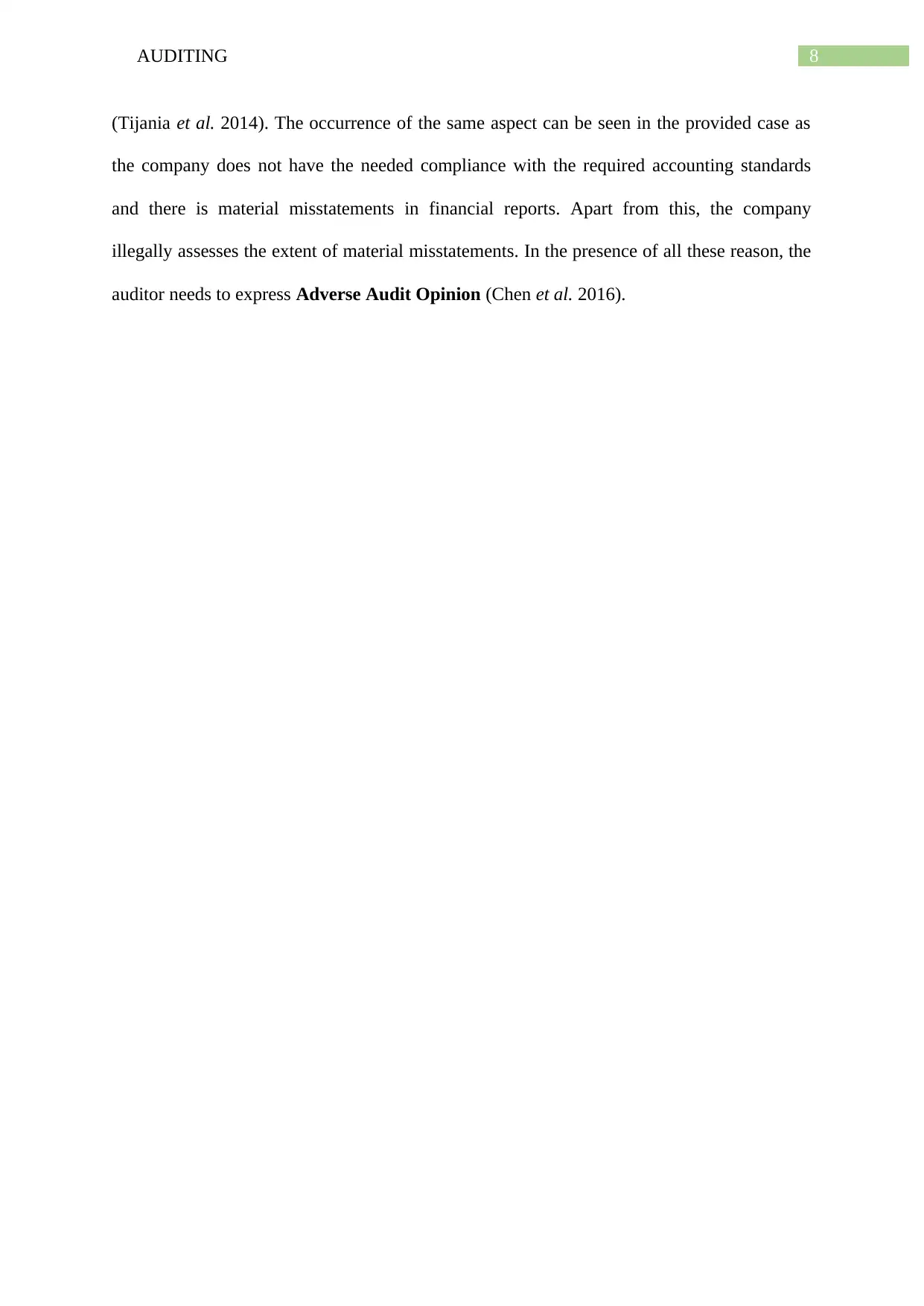
8AUDITING
(Tijania et al. 2014). The occurrence of the same aspect can be seen in the provided case as
the company does not have the needed compliance with the required accounting standards
and there is material misstatements in financial reports. Apart from this, the company
illegally assesses the extent of material misstatements. In the presence of all these reason, the
auditor needs to express Adverse Audit Opinion (Chen et al. 2016).
(Tijania et al. 2014). The occurrence of the same aspect can be seen in the provided case as
the company does not have the needed compliance with the required accounting standards
and there is material misstatements in financial reports. Apart from this, the company
illegally assesses the extent of material misstatements. In the presence of all these reason, the
auditor needs to express Adverse Audit Opinion (Chen et al. 2016).
⊘ This is a preview!⊘
Do you want full access?
Subscribe today to unlock all pages.

Trusted by 1+ million students worldwide
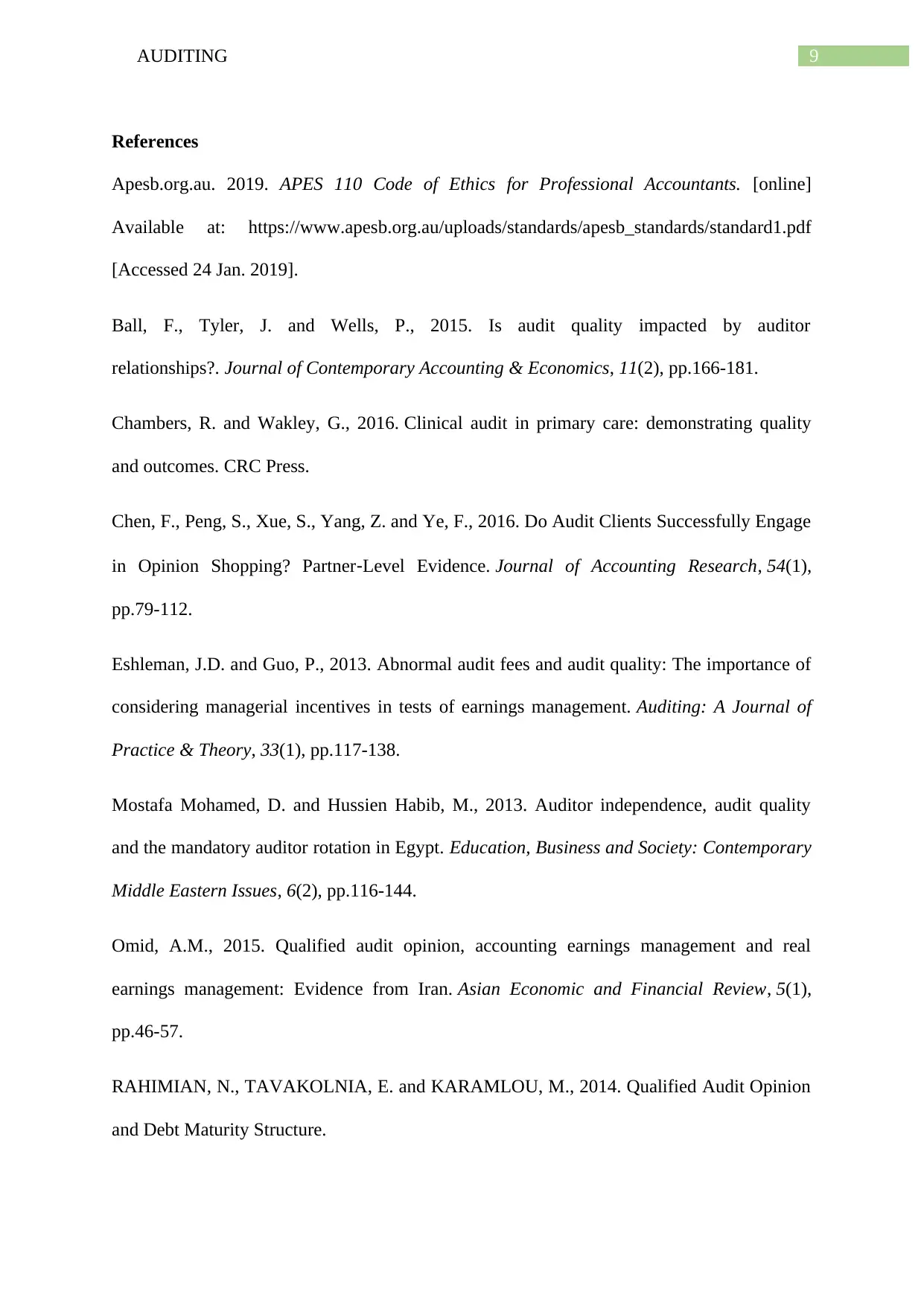
9AUDITING
References
Apesb.org.au. 2019. APES 110 Code of Ethics for Professional Accountants. [online]
Available at: https://www.apesb.org.au/uploads/standards/apesb_standards/standard1.pdf
[Accessed 24 Jan. 2019].
Ball, F., Tyler, J. and Wells, P., 2015. Is audit quality impacted by auditor
relationships?. Journal of Contemporary Accounting & Economics, 11(2), pp.166-181.
Chambers, R. and Wakley, G., 2016. Clinical audit in primary care: demonstrating quality
and outcomes. CRC Press.
Chen, F., Peng, S., Xue, S., Yang, Z. and Ye, F., 2016. Do Audit Clients Successfully Engage
in Opinion Shopping? Partner‐Level Evidence. Journal of Accounting Research, 54(1),
pp.79-112.
Eshleman, J.D. and Guo, P., 2013. Abnormal audit fees and audit quality: The importance of
considering managerial incentives in tests of earnings management. Auditing: A Journal of
Practice & Theory, 33(1), pp.117-138.
Mostafa Mohamed, D. and Hussien Habib, M., 2013. Auditor independence, audit quality
and the mandatory auditor rotation in Egypt. Education, Business and Society: Contemporary
Middle Eastern Issues, 6(2), pp.116-144.
Omid, A.M., 2015. Qualified audit opinion, accounting earnings management and real
earnings management: Evidence from Iran. Asian Economic and Financial Review, 5(1),
pp.46-57.
RAHIMIAN, N., TAVAKOLNIA, E. and KARAMLOU, M., 2014. Qualified Audit Opinion
and Debt Maturity Structure.
References
Apesb.org.au. 2019. APES 110 Code of Ethics for Professional Accountants. [online]
Available at: https://www.apesb.org.au/uploads/standards/apesb_standards/standard1.pdf
[Accessed 24 Jan. 2019].
Ball, F., Tyler, J. and Wells, P., 2015. Is audit quality impacted by auditor
relationships?. Journal of Contemporary Accounting & Economics, 11(2), pp.166-181.
Chambers, R. and Wakley, G., 2016. Clinical audit in primary care: demonstrating quality
and outcomes. CRC Press.
Chen, F., Peng, S., Xue, S., Yang, Z. and Ye, F., 2016. Do Audit Clients Successfully Engage
in Opinion Shopping? Partner‐Level Evidence. Journal of Accounting Research, 54(1),
pp.79-112.
Eshleman, J.D. and Guo, P., 2013. Abnormal audit fees and audit quality: The importance of
considering managerial incentives in tests of earnings management. Auditing: A Journal of
Practice & Theory, 33(1), pp.117-138.
Mostafa Mohamed, D. and Hussien Habib, M., 2013. Auditor independence, audit quality
and the mandatory auditor rotation in Egypt. Education, Business and Society: Contemporary
Middle Eastern Issues, 6(2), pp.116-144.
Omid, A.M., 2015. Qualified audit opinion, accounting earnings management and real
earnings management: Evidence from Iran. Asian Economic and Financial Review, 5(1),
pp.46-57.
RAHIMIAN, N., TAVAKOLNIA, E. and KARAMLOU, M., 2014. Qualified Audit Opinion
and Debt Maturity Structure.
Paraphrase This Document
Need a fresh take? Get an instant paraphrase of this document with our AI Paraphraser
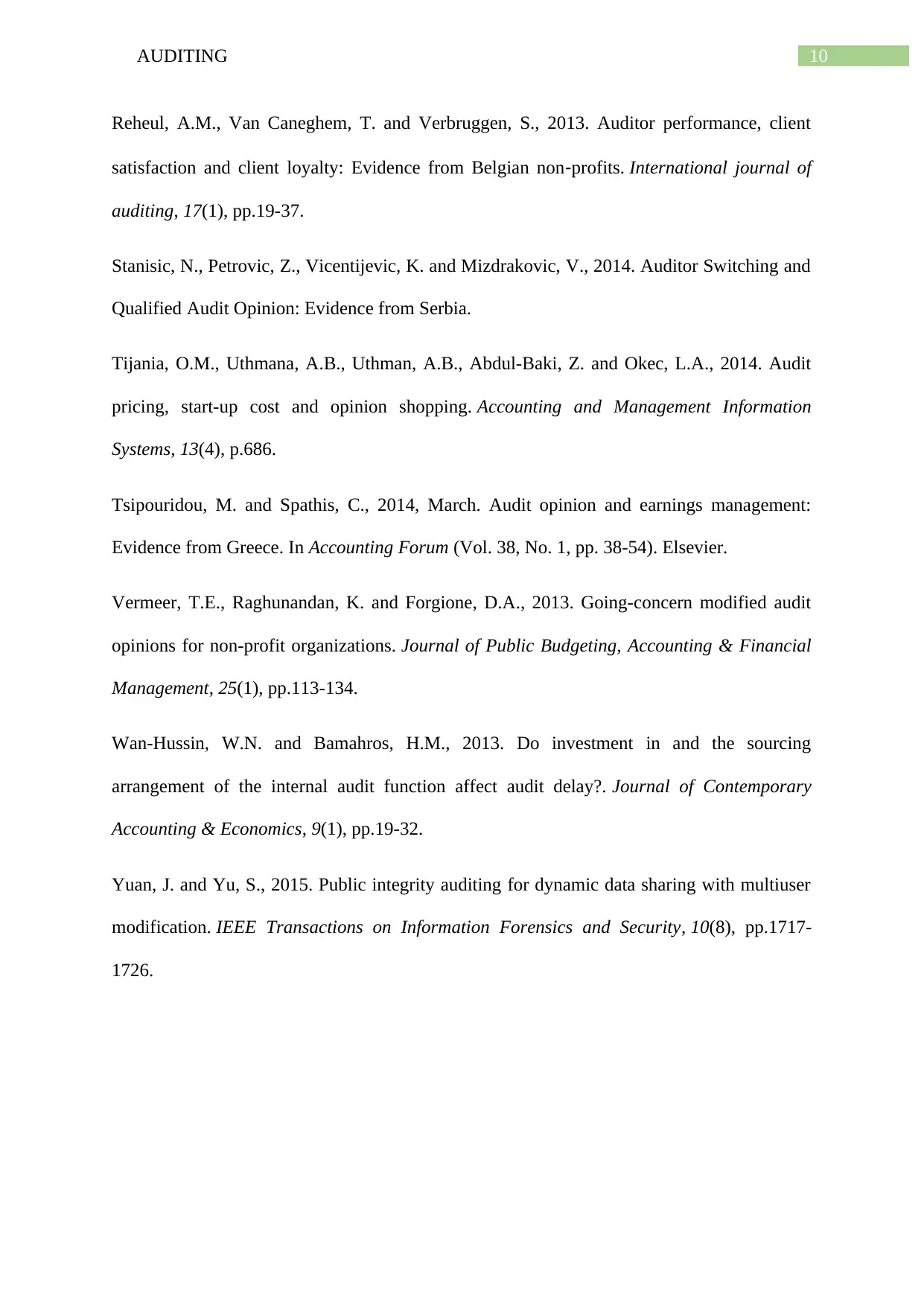
10AUDITING
Reheul, A.M., Van Caneghem, T. and Verbruggen, S., 2013. Auditor performance, client
satisfaction and client loyalty: Evidence from Belgian non‐profits. International journal of
auditing, 17(1), pp.19-37.
Stanisic, N., Petrovic, Z., Vicentijevic, K. and Mizdrakovic, V., 2014. Auditor Switching and
Qualified Audit Opinion: Evidence from Serbia.
Tijania, O.M., Uthmana, A.B., Uthman, A.B., Abdul-Baki, Z. and Okec, L.A., 2014. Audit
pricing, start-up cost and opinion shopping. Accounting and Management Information
Systems, 13(4), p.686.
Tsipouridou, M. and Spathis, C., 2014, March. Audit opinion and earnings management:
Evidence from Greece. In Accounting Forum (Vol. 38, No. 1, pp. 38-54). Elsevier.
Vermeer, T.E., Raghunandan, K. and Forgione, D.A., 2013. Going-concern modified audit
opinions for non-profit organizations. Journal of Public Budgeting, Accounting & Financial
Management, 25(1), pp.113-134.
Wan-Hussin, W.N. and Bamahros, H.M., 2013. Do investment in and the sourcing
arrangement of the internal audit function affect audit delay?. Journal of Contemporary
Accounting & Economics, 9(1), pp.19-32.
Yuan, J. and Yu, S., 2015. Public integrity auditing for dynamic data sharing with multiuser
modification. IEEE Transactions on Information Forensics and Security, 10(8), pp.1717-
1726.
Reheul, A.M., Van Caneghem, T. and Verbruggen, S., 2013. Auditor performance, client
satisfaction and client loyalty: Evidence from Belgian non‐profits. International journal of
auditing, 17(1), pp.19-37.
Stanisic, N., Petrovic, Z., Vicentijevic, K. and Mizdrakovic, V., 2014. Auditor Switching and
Qualified Audit Opinion: Evidence from Serbia.
Tijania, O.M., Uthmana, A.B., Uthman, A.B., Abdul-Baki, Z. and Okec, L.A., 2014. Audit
pricing, start-up cost and opinion shopping. Accounting and Management Information
Systems, 13(4), p.686.
Tsipouridou, M. and Spathis, C., 2014, March. Audit opinion and earnings management:
Evidence from Greece. In Accounting Forum (Vol. 38, No. 1, pp. 38-54). Elsevier.
Vermeer, T.E., Raghunandan, K. and Forgione, D.A., 2013. Going-concern modified audit
opinions for non-profit organizations. Journal of Public Budgeting, Accounting & Financial
Management, 25(1), pp.113-134.
Wan-Hussin, W.N. and Bamahros, H.M., 2013. Do investment in and the sourcing
arrangement of the internal audit function affect audit delay?. Journal of Contemporary
Accounting & Economics, 9(1), pp.19-32.
Yuan, J. and Yu, S., 2015. Public integrity auditing for dynamic data sharing with multiuser
modification. IEEE Transactions on Information Forensics and Security, 10(8), pp.1717-
1726.
1 out of 11
Related Documents
Your All-in-One AI-Powered Toolkit for Academic Success.
+13062052269
info@desklib.com
Available 24*7 on WhatsApp / Email
![[object Object]](/_next/static/media/star-bottom.7253800d.svg)
Unlock your academic potential
Copyright © 2020–2026 A2Z Services. All Rights Reserved. Developed and managed by ZUCOL.





